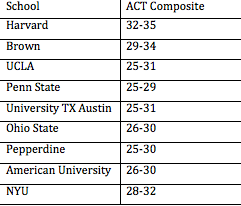 |
| Image by Wokandapix |
 |
| Image by Wokandapix |
Posted By:
Admin
Posted on:
9:23 PM
Filed Under:
admissions tips, extra curreculars, importance of grades, SAT, Standardized tests
| Avoiding Exam Stress: Flickr - CollegeDegrees360 |
| Avoiding Exam Stress: Stockvault |
Posted By:
Admin
Posted on:
3:49 AM
Filed Under:
hot to get good scores on exams, solving stress issues on exams, Standardized tests, tips for passing your exams
| Photo: Stockvault |
Posted By:
Admin
Posted on:
1:00 PM
Filed Under:
get a high score on the GRE, high school math on GRE, Standardized tests
| Photo: Stockvault |
Posted By:
Admin
Posted on:
10:00 AM
Filed Under:
British education system, College Admissions in the UK, Standardized tests
Posted By:
Admin
Posted on:
1:13 PM
Filed Under:
how do you best prepare for the GRE, other grad, Standardized tests
School
|
SAT Math
|
SAT Reading
|
SAT Writing
|
Harvard
|
710-790
|
700-800
|
710-800
|
Brown
|
660-770
|
660-760
|
670-780
|
UCLA
|
600-760
|
560-680
|
590-710
|
Penn State
|
560-670
|
530-630
|
540-640
|
University TX Austin
|
580-710
|
550-670
|
540-680
|
Ohio State
|
610-710
|
540-650
|
550-650
|
American University
|
570-670
|
590-690
|
580-680
|
Pepperdine
|
570-680
|
550-650
|
560-670
|
NYU
|
630-740
|
620-710
|
640-730
|
 |
| ACT Composite Score Averages |
Literature
|
576
|
Chinese Listening
|
758
|
US History
|
608
|
French
|
622
|
World History
|
607
|
French Listening
|
646
|
Math 1
|
610
|
German
|
622
|
Math 2
|
654
|
German Listening
|
611
|
Biology
|
605 (Micro 635)
|
Hebrew
|
623
|
Chemistry
|
648
|
Italian
|
666
|
Physics
|
656
|
Japanese
|
684
|
Korean Listening
|
767
|
Spanish
|
647
|
Latin
|
611
|
Spanish Listening
|
663
|
Posted By:
Admin
Posted on:
2:21 PM
Filed Under:
average test scores for college, collegeboard grading, Education, is a 1700 on the SAT good, is my SAT score good enough for college, Standardized tests, what is a good sat score for 2013